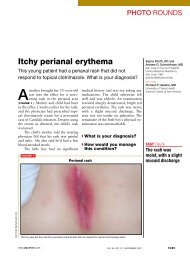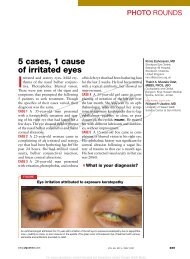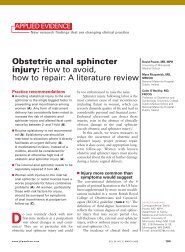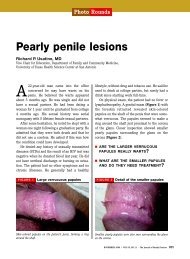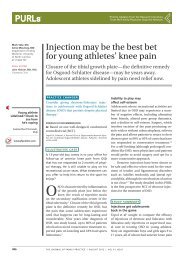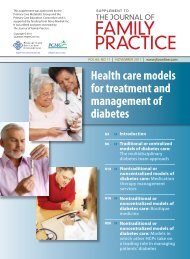Management of morbid obesity - The Journal of Family Practice
Management of morbid obesity - The Journal of Family Practice
Management of morbid obesity - The Journal of Family Practice
Create successful ePaper yourself
Turn your PDF publications into a flip-book with our unique Google optimized e-Paper software.
surgery programs, is an effective intervention that can<br />
facilitate significant improvement in many co<strong>morbid</strong>ities.<br />
A thorough physical examination and disease-specific<br />
testing are also recommended. Cardiovascular<br />
assessment, via a stress imaging study such as echocardiography<br />
or nuclear imaging, should be considered in<br />
patients older than 50 years and in those whose <strong>obesity</strong>-related<br />
co<strong>morbid</strong>ities (especially diabetes, hypercholesterolemia,<br />
and hypertension) have been present for<br />
more than 10 years. Administration <strong>of</strong> dobutamine or<br />
adenosine <strong>of</strong>ten is needed to achieve target heart rates in<br />
patients with limited mobility.<br />
A 12-lead EKG should be performed to assess,<br />
among other things, for Q-Tc interval prolongation.<br />
Obese patients with acquired Q-Tc interval prolongation<br />
have increased risk for postoperative malignant<br />
arrhythmias. 6<br />
Sleep apnea is common in the severely obese, but is<br />
<strong>of</strong>ten overlooked or misdiagnosed as depression or<br />
chronic fatigue syndrome. A polysomnogram or, if it is<br />
not available, nocturnal pulse oximetry should be<br />
arranged for patients with loud snoring and documented<br />
apneic episodes, significant daytime somnolence,<br />
and/or early morning headache.<br />
A routine workup that includes complete blood<br />
count, liver function studies, and disease-specific serologies<br />
may be augmented by additional testing, such as<br />
right upper quadrant ultrasound to assess for cholelithiasis<br />
and liver size and steatosis, stool analysis for<br />
Helicobacter pylori antigen, and measurement <strong>of</strong> bone<br />
mineral density.<br />
Preoperative placement <strong>of</strong> an inferior vena cava filter<br />
may be considered in patients with a high risk for<br />
deep vein thrombosis and pulmonary embolism. 7<br />
However, prophylactic use <strong>of</strong> such filters needs to be<br />
validated by prospective, randomized trials. White et al,<br />
for example, found that a vena cava filter did not reduce<br />
the incidence <strong>of</strong> pulmonary embolism and, in patients<br />
with previous pulmonary embolism, it was associated<br />
with a higher incidence <strong>of</strong> rehospitalization for venous<br />
thrombosis. 8<br />
Nutritional evaluation. A registered dietitian or<br />
nutritionist is instrumental in preoperative weight-loss<br />
counseling and, to that end, will assess food intake and<br />
identify eating triggers such as emotional upset.<br />
TABLE 1<br />
THE JOURNAL OF<br />
FAMILY<br />
PRACTICE<br />
Indications and contraindications<br />
for bariatric surgery<br />
Indications<br />
• BMI ≥40 kg/m 2<br />
• BMI ≥35 kg/m 2 and high-risk co<strong>morbid</strong>ity*<br />
• Failed attempts at behavioral and medical therapy †<br />
• Motivated, psychologically stable, realistic<br />
expectations<br />
• Understanding <strong>of</strong> procedure, acceptance <strong>of</strong><br />
operative risks, and commitment to lifelong<br />
behavioral changes<br />
• Commitment to long-term follow-up<br />
• Supportive family environment<br />
Contraindications<br />
• Unacceptable medical risks<br />
• Unresolved alcohol or drug abuse<br />
• Depression, especially involving suicidal ideation<br />
• Hostile, uncooperative patient and/or family<br />
*Cardiopulmonary conditions (eg, sleep apnea, cardiomyopathy,<br />
pickwickian syndrome), type 2 diabetes, joint disease, and body-size<br />
problems that interfere with ambulation and employment.<br />
† Or judged as unlikely to succeed at behavioral and medical<br />
approaches to weight loss.<br />
Adapted from NIH Consensus Development Conference Panel2 and<br />
Mun et al. 3<br />
Counseling also includes repeated review <strong>of</strong> the progressive<br />
dietary stages that the patient will be expected to follow<br />
after surgery. Postoperatively, the dietitian/nutritionist<br />
will monitor the patient for adequate nutrient intake.<br />
Psychologic/psychiatric evaluation. Assessment<br />
<strong>of</strong> mental status should be done by a psychologist or<br />
psychiatrist who is familiar with the psychologic/emotional<br />
abnormalities common to the <strong>morbid</strong>ly obese, as<br />
well as the ramifications <strong>of</strong> bariatric surgery. <strong>The</strong> focus<br />
<strong>of</strong> the mental health examination is on eating disorders/behaviors<br />
(binge eating, in particular), uncontrolled<br />
major depression, and personality disorders.<br />
<strong>The</strong> mental health pr<strong>of</strong>essional also needs to confirm<br />
that the patient has realistic expectations <strong>of</strong> surgery<br />
and fully understands and accepts the postoperative<br />
lifestyle and behavioral changes that will be required.<br />
<strong>The</strong> strength <strong>of</strong> the patient’s support network is another<br />
important issue, given the high rates <strong>of</strong> marital and<br />
March 2005 Supplement to <strong>The</strong> <strong>Journal</strong> <strong>of</strong> <strong>Family</strong> <strong>Practice</strong> 19



